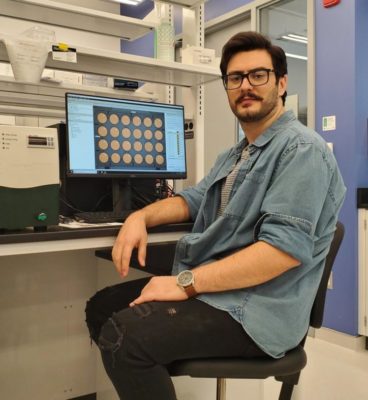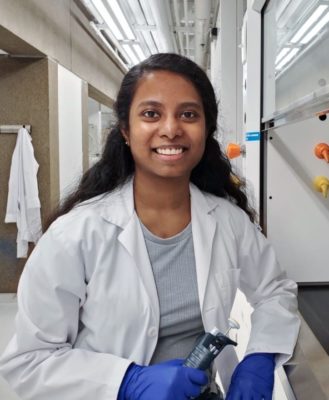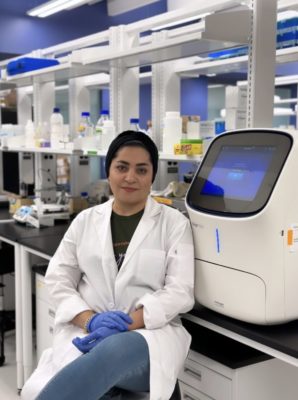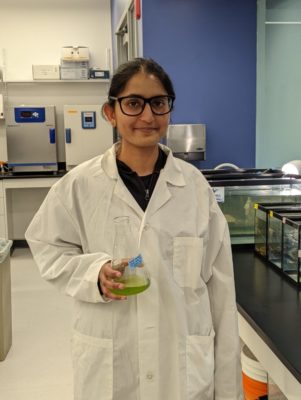
Mohammad Naderi (Postdoctoral fellow)
Research: Effects of endocrine disruptors on neurophysiological function in zebrafish. 2019 York Science Fellowship, & 2021 Banting Fellowship.
My research mainly focuses on the effects of environmental contaminants on fish brain and behavior. My current project investigates the role of endocrine disruptors in the etiology of neurodevelopmental disorders (e.g., autism) using the zebrafish model. In this regard, I am seeking to unravel the mechanisms by which certain endocrine-disrupting chemicals such as plasticizers may contribute to the pathogenesis of autism. The findings of my study may open the possibility to new therapeutic strategies as well as public policy interventions to reduce human and animal exposure to these chemicals.

Theanuga Chandrapalan (PhD candidate)
Research: Regulation of iron homeostasis in zebrafish. 2021 & 2023 Ontario Graduate Scholarship.
My research focuses on understanding the homeostatic processes involved in iron regulation. As an essential metal, there is much that remains unknown with regard to the vast and complex effects of iron on fish. Additionally, fish are susceptible to changing environmental conditions with exposure to metal mixtures via both waterborne and dietary. In my study, I will be examining the molecular mechanisms underlying the homeostasis of iron, and the effects of exposure to metal mixture on iron balance and the physiological performance in the vertebrate model zebrafish

Maryam Zarean Adarmanabadi (PhD candidate)
Research: Prevalence and impacts of antibiotics and antibiotics-resistome in aquatic environments. Recipient of the Elia Scholar Award.
Co-supervisor: Prof. Satinder Brar.
My research focuses on the impacts of emerging environmental contaminants on the environment and human health. My current project investigates the role of microplastics, a new microbial niche, in the proliferation and distribution of antibiotic resistance genes (ARGs) as emerging contaminants. Due to the growing amount of attention in the past few years to understanding the antibiotic-resistant elements, the findings of my research may provide new insights into the microplastic biofilm as an important carrier for antibiotic resistance expression and dissemination in waters and their impacts on aquatic health.

Sejal Dave (MSc candidate)
Research: Interactive effects of feeding and flow mechanics on the bioaccumulation of microplastics in aquatic invertebrates.
Co-supervisor: Prof. Shooka Karimpour.
My research is focused on understanding the physiological processes regulating the bioaccumulation of microplastics (MPs) in macroinvertebrates and on identifying relevant bioindicators. Bioindicators are living organisms whose reactions can tell us the condition of an ecosystem, and we can use this information to predict future trends. Specifically, I will use water fleas and mussels to assess how environmental conditions such as food abundance and flow mechanics affect MP accumulation in the animals. We also hope to understand how flow mechanics affect the accumulation of MPs (e.g., amount, type, and size of MPs) in macroinvertebrates collected from Lake Ontario.

Nhi Nguyen (MSc candidate)
Research: Development of a novel zebrafish model to investigate the mechanisms of neuro-regeneration. 2023 Ontario Graduate Scholarship and Queen Elizabeth II Graduate Scholarship in Science and Technology
Parkinson’s disease (PD) is one of the most common neurodegenerative diseases. Unfortunately, a treatment that can interfere with the progression of PD is not yet available. To expand the current knowledge of PD molecular mechanisms and to design better treatments for PD, we ultilize the zebrafish model, one of the rare vertebrates with neuronal regenerative abilities post-embryonic development, as our model organism. By investigating how neurons are regenerated in replacement of the damaged ones in the fish, we hope to develop neurotherapeutic strategies to reverse or terminate the degenerative deficits observed in PD patients. We will employ a combination of genetic and cellular neurophysiological technologies in addition to behavioural paradigms to investigate neural degeneration and regeneration processes.
Mahtab Zonouzi-Marand (PhD candidate) Research: Neurobehavioral effects of metal-containing nanoparticles on zebrafish.
Former graduate and honours thesis research students
2019 - 2023. Mohammad Naderi (Banting PDF)
2019 - 2022. Preeti Dave (MSc; co-supervisor: Prof. Chun Peng)
2021 - 2022. Thi My Nhi Ngugen, Fatima Hashemi-Sabet
2019 - 2021. Pankaj Puar (MSc; co-supervisor: Prof. Som Niyogi)
2019 Summer. Vadim Iahnenco (Bio BSc hons)
2017 - 2019. Ayaat Hassan (MSc)
2018 - 2019. Baharossadat Mahani (Bio BSc hons)
2018 - 2019. Fatema Ali (Bio BSc hons)
2017 - 2018. Umaimah Chudawala (Bio BSc hons)
2017 - 2018. Safia Farah (Bio BSc hons)
2017 Summer. Yehia Al Hashmi (Biochem BSc hons)
